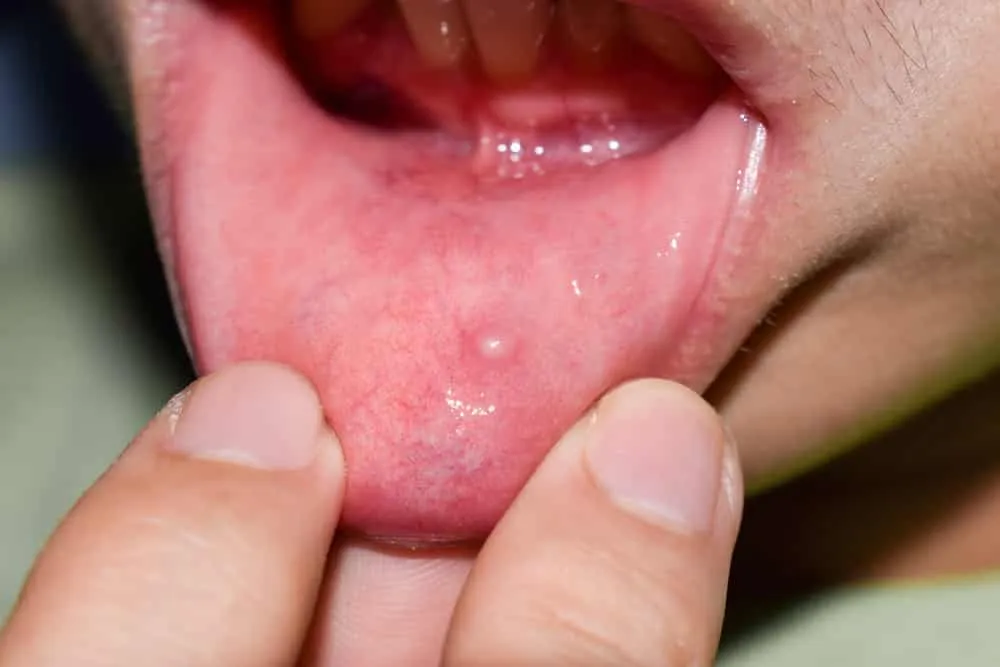Oral health is essential to our overall well-being, yet many people often overlook symptoms that may indicate underlying conditions. One such condition that can develop within the mouth is an oral cyst. While these cysts are typically benign, meaning they are non-cancerous, they can lead to discomfort, and if left untreated, may cause complications. Understanding oral cysts, their symptoms, and early warning signs can help you address the condition before it becomes more serious.
What is an Oral Cyst?
An oral cyst is a fluid-filled sac that develops in the tissues of the mouth, jaw, or surrounding areas. These cysts can vary in size and may form in the gums, tongue, cheeks, or roof of the mouth. They often arise from infections, blocked glands, or other underlying health issues. While oral cysts are usually harmless and may resolve on their own, it’s important to monitor them for any changes, as some types require medical intervention.
There are several types of oral cysts, including:
- Dentigerous Cysts: These cysts are commonly associated with the growth of wisdom teeth or unerupted teeth.
- Radicular Cysts: Often linked to tooth decay or infections, these cysts form at the root of a dead or dying tooth.
- Mucocele Cysts: Typically caused by trauma or blocked salivary glands, these cysts form on the lips or inner cheeks.
- Palatal Cysts: These are cysts that occur in the roof of the mouth and are often congenital (present at birth).
Common Symptoms of Oral Cysts
Recognizing the signs of an oral cyst can help you seek treatment early, potentially avoiding further complications. While symptoms can vary depending on the type and location of the cyst, some general warning signs to watch for include:
1. Pain or Discomfort
The most noticeable sign of an oral cyst is discomfort in the affected area. This may range from mild sensitivity to intense pain, depending on the size of the cyst and its proximity to nerves. If the cyst is pressing against sensitive tissues or causing an infection, it may cause throbbing or sharp pain. However, some cysts may be asymptomatic in the early stages, meaning you might not feel pain until the cyst grows larger.
2. Swelling
Swelling is another common sign of an oral cyst. You may notice a lump or bulge in the gums, roof of the mouth, or other areas of the mouth. Swelling may appear gradually or suddenly, depending on the cyst’s size and location. If the cyst becomes large, it can affect the appearance of your smile and make it difficult to chew or speak comfortably.
3. Visible Lumps or Bumps
One of the most obvious signs of an oral cyst is the appearance of a lump or bump in the mouth. This may occur along the gum line or in the cheek, lips, or tongue. The cyst may feel soft and fluid-filled, or it may be more firm to the touch. The size and texture of the cyst can vary, but if you notice a lump that does not go away or continues to grow, it’s essential to seek professional help.
4. Bad Breath (Halitosis)
Infections caused by oral cysts can sometimes lead to halitosis or bad breath. As cysts develop, they may harbor bacteria, leading to an unpleasant odor in the mouth. If bad breath persists, despite regular brushing and oral hygiene, this could be a sign that an infection is present, and the cyst needs medical attention.
5. Changes in Taste or Mouth Sensitivity
Some people with oral cysts may experience a strange taste in their mouth, especially if the cyst is located near salivary glands. This altered taste could be caused by an infection or the presence of fluid in the cyst. Additionally, oral cysts can lead to increased sensitivity in the surrounding areas. For example, you may notice that your teeth or gums are more sensitive when brushing or eating hot or cold foods.
6. Difficulty Swallowing or Chewing
As oral cysts grow in size, they may interfere with normal mouth function. Difficulty swallowing or chewing can occur if the cyst is blocking the normal flow of saliva or affecting the alignment of your teeth. If you experience pain or discomfort while eating, or find that your mouth feels too crowded or tight, a cyst may be the cause.
When to Seek Medical Attention
While many oral cysts are not serious and can resolve on their own, it’s crucial to consult with a dentist or oral surgeon if you experience any of the symptoms mentioned above. Early detection can help prevent complications such as infections, tooth damage, or cyst rupture. If you notice:
- Unexplained swelling or lumps in your mouth
- Persistent pain or discomfort
- Difficulty speaking, chewing, or swallowing
- A noticeable change in the appearance of your mouth
It’s essential to make an appointment with a dentist or oral surgeon in Richmond, Indiana. They can thoroughly examine your mouth, determine the type of cyst, and suggest the best course of treatment. In some instances, treatment may involve draining the cyst, prescribing antibiotics to address any infections, or performing surgical removal of the cyst.
Prevention and Aftercare
While not all oral cysts can be prevented, maintaining good oral hygiene can reduce the risk of developing infections that lead to cyst formation. Brushing and flossing regularly, using mouthwash, and visiting the dentist for routine checkups can help detect problems early on. If a cyst is diagnosed, following your dentist’s advice for treatment and aftercare is crucial to ensure proper healing.
In Conclusion
Oral cysts may seem like a minor issue, but understanding their symptoms and early warning signs is essential for maintaining good oral health. By staying vigilant and consulting a healthcare professional when necessary, you can avoid complications and address any issues before they worsen. Keep an eye out for pain, swelling, or lumps, and don’t hesitate to seek professional help to keep your smile healthy and beautiful.




